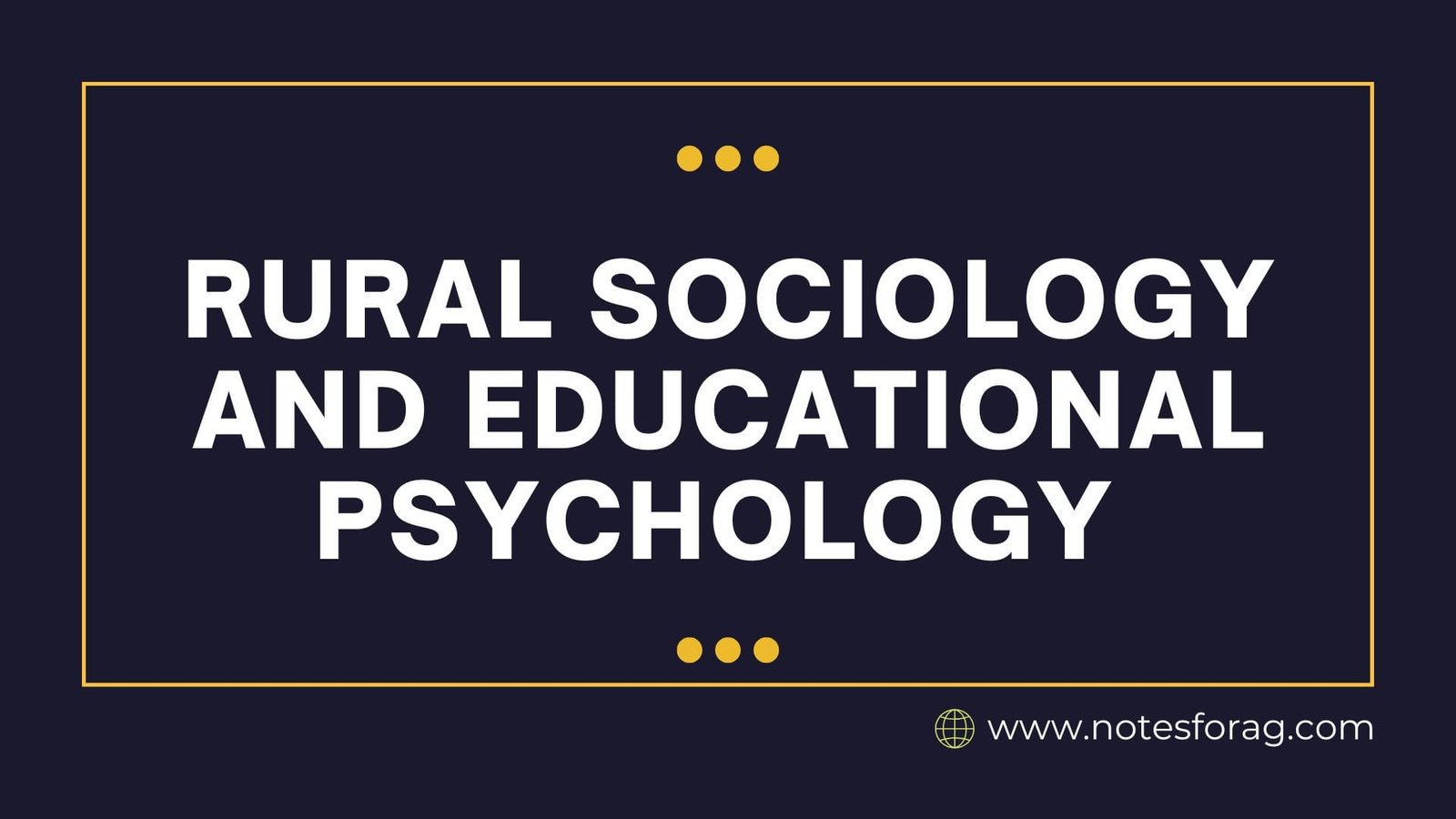Rural Sociology and Educational Psychology are distinct fields of study that overlap significantly, especially in areas like agriculture, rural development, and education. Each field provides unique insights that, when integrated, can address the multifaceted challenges faced by rural communities, particularly in terms of learning, behavior, and societal development.
Table of Contents
About Rural Sociology and Educational Psychology
Rural Sociology and Educational Psychology are distinct fields of study that overlap significantly, especially in areas like agriculture, rural development, and education. Rural Sociology is a specialized branch of sociology that focuses on the study of social relationships, institutions, and processes in rural areas. It examines how these elements influence the lives of individuals and communities in less urbanized settings. Educational Psychology is the branch of psychology that focuses on understanding how people learn and develop in educational settings. It applies psychological principles to improve teaching methods, learning processes, and overall educational outcomes.
Rural Sociology
Rural sociology is the study of social structures, relationships, and problems in rural areas. It focuses on understanding rural communities, their dynamics, and the challenges they face in modern society.
Key Topics
- Characteristics
- Close-knit communities.
- Predominantly agriculture-based economy.
- Traditional values and practices.
- Social Structures in Rural Areas
- Family, caste, and kinship systems.
- Roles of community institutions (e.g., Panchayati Raj, cooperatives).
- Rural Development
- Role of education, health, and infrastructure.
- Government schemes and policies for rural upliftment.
- Importance of NGOs and self-help groups (SHGs).
- Migration and Urbanization
- Push and pull factors of rural-urban migration.
- Impact of urbanization on rural lifestyles and economy.
- Cultural Practices
- Festivals, rituals, and folk traditions.
- Influence of globalization on rural culture.
- Challenges in Rural Communities
- Poverty and unemployment.
- Lack of access to quality education and healthcare.
- Gender inequality and marginalization.
Applications
- Policy-making for rural development.
- Promoting sustainable agricultural practices.
- Bridging gaps between rural and urban societies.
Educational Psychology
Educational psychology focuses on how individuals learn and develop within educational settings. It combines psychology principles to enhance teaching and learning processes.
Key Topics
- Learning Theories
- Behaviorism: Learning through reinforcement (Pavlov, Skinner).
- Cognitivism: Mental processes like memory and problem-solving (Piaget, Vygotsky).
- Constructivism: Learning as an active, contextualized process (Bruner, Dewey).
- Developmental Psychology
- Stages of cognitive and emotional development (Piaget, Erikson).
- Impacts of family and environment on learning.
- Motivation in Education
- Intrinsic vs. extrinsic motivation.
- Role of rewards, recognition, and self-determination in learning.
- Individual Differences
- Addressing diverse needs (gifted learners, special education).
- Learning styles (visual, auditory, kinesthetic).
- Mental Health and Learning
- Stress, anxiety, and their effects on performance.
- Counseling and interventions to support students.
- Educational Assessment
- Standardized testing vs. formative assessments.
- Evaluating learning outcomes and teaching effectiveness.
Applications
- Designing effective teaching strategies.
- Developing inclusive education systems.
- Training teachers to understand student behavior.
- Promoting mental well-being in educational settings.
Interconnection Between Rural Sociology and Educational Psychology
- Rural Education
- Understanding rural social structures helps tailor educational programs to community needs.
- Educational psychology aids in addressing the unique learning challenges of rural students.
- Behavioral Studies
- Rural sociology provides insights into community norms, while educational psychology focuses on individual behavior within that context.
- Empowering Rural Communities
- Combining the two fields can create better education systems that foster self-reliance and rural development.
Frequently Asked Questions
What is rural sociology?
Rural sociology is the study of social structures, relationships, and problems within rural communities. It focuses on understanding how people interact in rural settings and the challenges they face, such as poverty, migration, and lack of access to education or healthcare.
What is educational psychology?
Educational psychology studies how people learn and develop in educational settings. It focuses on cognitive, emotional, and social factors that affect learning and behavior.
How do rural sociology and educational psychology work together?
Rural sociology provides insights into the social and cultural context of rural learners, while educational psychology focuses on individual learning needs and behaviors. Together, rural sociology and educational psychology create a holistic approach to rural education and development.
How can education programs for rural communities be improved using these fields?
Rural sociology can inform the content of educational programs to make them culturally and economically relevant.
Educational psychology can guide teaching strategies to improve learning outcomes and address behavioral challenges.
Related Notes
Livestock Production & Management
Introduction to Meteorology & Climate Change

